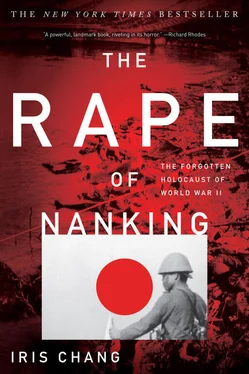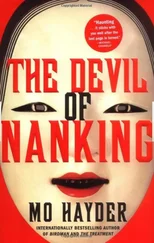The last part of my book examines the forces that conspired to keep the Rape of Nanking out of public consciousness for more than half a century. I also treat the recent efforts to ensure that this distortion of history does not go unchallenged.
Any attempt to set the record straight must shed light on how the Japanese, as a people, manage, nurture, and sustain their collective amnesia—even denial—when confronted with the record of their behavior through this period. Their response has been more than a matter of leaving blank spaces in the history books where the record would have been too painful. The ugliest aspects of Japanese military behavior during the Sino-Japanese War have indeed been left out of the education of Japanese schoolchildren. But they have also camouflaged the nation’s role in initiating the war within the carefully cultivated myth that the Japanese were the victims, not the instigators, of World War II. The horror visited on the Japanese people during the atomic bombings of Hiroshima and Nagasaki helped this myth replace history.
When it comes to expressing remorse for its own wartime actions before the bar of world opinion, Japan remains to this day a renegade nation. Even in the period directly after the war, and despite the war crimes trials that found a few of its leaders guilty, the Japanese managed to avoid the moral judgment of the civilized world that the Germans were made to accept for their actions in this nightmare time. In continuing to avoid judgment, the Japanese have become the ringleaders of another criminal act. As the Nobel laureate Elie Wiesel warned years ago, to forget a holocaust is to kill twice.
My greatest hope is that this book will inspire other authors and historians to investigate the stories of the Nanking survivors before the last of the voices from the past, dwindling in number every year, are extinguished forever. Possibly even more important, I hope it will stir the conscience of Japan to accept responsibility for this incident.
This book was written with George Santayana’s immortal warning in mind: Those who cannot remember the past are condemned to repeat it.
IN TRYING to understand the actions of the Japanese, the questions that call out loudest for answers are the most obvious ones. What broke down on the scene to allow the behavior of Japanese soldiers to escape so totally the restraints that govern most human conduct? Why did the Japanese officers permit and even encourage such a breakdown? What was the complicity of the Japanese government? At the very least, what was its reaction to the reports it was getting through its own channels and to what it was hearing from foreign sources on the scene?
To answer these questions we must begin with a little history.
The twentieth-century Japanese identity was forged in a thousand-year-old system in which social hierarchy was established and sustained through martial competition. For as far back as anyone could remember, the islands’ powerful feudal lords employed private armies to wage incessant battle with each other; by the medieval times these armies had evolved into the distinctively Japanese samurai warrior class, whose code of conduct was called bushido (the “Way of the Warrior”). To die in the service of one’s lord was the greatest honor a samurai warrior could achieve in his lifetime.
Such codes of honor were certainly not invented by Japanese culture. The Roman poet Horace first defined the debt owed by the young men of each generation to their rulers— Dulce et decorum est pro patria mori. But the samurai philosophy went a giant step beyond defining military service as fitting and proper. So harsh was its code that its most notable characteristic was the moral imperative that adherents commit suicide if ever they failed to meet honorably the obligations of military service—often with the highly ceremonial and extremely painful ritual of hara-kiri, in which the warrior met death by unflinchingly disemboweling himself in front of witnesses.
By the twelfth century the head of the reigning (and thereby most powerful) family, now called the Shogun, offered the emperor, who was worshiped as the direct descendant of the Sun Goddess, military protection of his samurai in exchange for divine sanction of the entire ruling class. A deal was struck. In time the code of the samurai, initially followed by only a small percentage of the population, penetrated deep into the Japanese culture and became the model of honorable behavior among all young men.
Time did not erode the strength of the bushido ethic, which first emerged in the eighteenth century and was practiced to extremes in the modern age. During World War II the infamous kamikaze suicide missions, in which Japanese pilots ceremoniously trained to fly their planes directly into American ships, dramatically impressed upon the West how ready the young men of Japan were to sacrifice their lives for the emperor. But it was more than a small elite group that held to the view of death over surrender. It is striking to note that while the Allied forces surrendered at the rate of 1 prisoner for every 3 dead, the Japanese surrendered at the rate of only 1 per 120 dead.
Another force that gave Japan its peculiar character was its isolation, both physical and self-imposed. By the late fifteenth and early sixteenth centuries Japan was ruled by the Tokugawa clan, who sealed off the island nation from foreign influence. This seclusion, intended to provide security from the wider world, instead insulated Japanese society from the new technology of the industrial revolution taking place in Europe and left it less secure. For 250 years Japanese military technology failed to advance beyond the bow, sword, and musket.
By the nineteenth century events beyond Japan’s control would knock the country out of its cocoon, leaving it in a state of insecurity and xenophobic desperation. In 1852, U.S. President Millard Fillmore, frustrated by Japan’s refusal to open its ports to commerce and taking the “white man’s burden” attitude toward other societies commonly espoused at the time to rationalize European expansionism, decided to end Japan’s isolation by dispatching Commander Matthew Perry to the island. Perry studied Japanese history carefully and decided to shock the Japanese into submission with a massive display of American military force. In July 1853, he sent a flotilla of ships belching black smoke into Tokyo Bay—giving the people of Japan their first glimpse of steam power. Surrounding himself with some sixty to seventy aggressive-looking men armed with swords and pistols, Perry strode through the capital of the Shogun and demanded meetings with the highest-ranking officials in Japan.
To say that the Japanese were stunned by Perry’s arrival would be a gross understatement. “A parallel situation,” the historian Samuel Eliot Morison wrote of the incident, “would be an announcement by astronauts that weird-looking aircraft from outer space were on their way to earth.” The terrified Tokugawa aristocracy prepared for battle, hid their valuables, and held panicked meetings among themselves. But in the end, they had no choice but to acknowledge the superiority of American military technology and to accept the mission. With this single visit, Perry not only forced the Tokugawa to sign treaties with the United States but broke down the doors of Japanese trade for other countries, such as Britain, Russia, Germany, and France.
The humiliation of this proud people left a residue of fierce resentment. Secretly some members of the Japanese power elite advocated immediate war with the Western powers, but others counseled prudence, arguing that war would weaken only Japan, not the foreigners. Those taking the latter position urged that the leadership placate the intruders, learn from them, and quietly plan their retaliation:
Читать дальше











